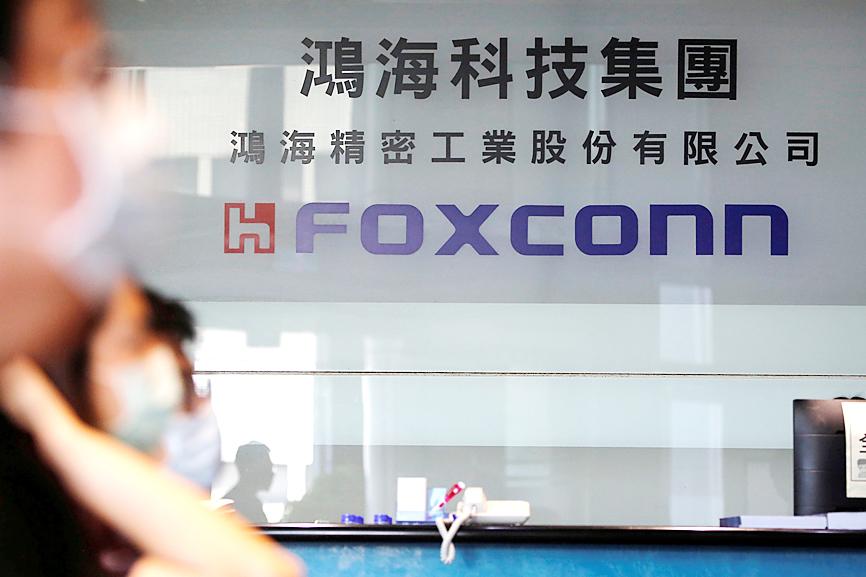Hon Hai Precision Industry Co (鴻海精密), a major assembler of Apple Inc’s iPhones, yesterday posted a 5.95 percent monthly decline in consolidated revenue to NT$550.89 billion (US$19.76 billion) for last month, as industry-wide component shortages caused a slowdown in production.
However, demand remains healthy, Hon Hai said.
Last month’s revenue was down 10.07 percent from a year earlier.

Photo: Ann Wang, Reuters
“People are waiting in line to buy our customers’ products,” the company said. “Demand is still there, and we see the parts-shortage crisis turning a corner.”
Revenue in the first 10 months of the year rose 17.53 percent to NT$4.655 trillion over the same period last year, hitting a historical high.
In terms of Hon Hai’s four main product groups, cloud and networking products grew the most month-on-month, followed by smart consumer electronics, components and computing products, Hon Hai said.
In terms of annual growth, components led the growth, followed by consumer electronics, cloud computing and computing products.
Monthly computing products sales might also have weakened in comparison to September’s back-to-school bump, the company said, adding that its “cautiously optimistic” projections for the fourth quarter are holding.
“We have not heard as much news about the COVID-19 pandemic in Vietnam or Malaysia, and no news is good news,” the company said.
Separately, iPhone camera module supplier Largan Precision Co (大立光) said revenue rose 0.74 percent month-on-month to NT$4.2 billion.
Although it was down 18.26 percent year-on-year, it was Largan’s highest month of revenue for nine months and set the company up for the fourth quarter being its strongest this year if revenues remain on track.
About 50 to 60 percent of Largan’s sales came from lenses with a pixel count of more than 10 megapixels. Eight-megapixel lenses and smaller accounted for about 10 to 20 percent, while the high-end market for lenses of more than 20 megapixels accounted for about 20 to 30 percent of sales.
Largan has been struggling all year with supply-chain issues and with some of its high-end lenses being too advanced for companies seeking a second source. The company is in the middle of a stock buyback to rally the price, which slid to NT$2,005 at yesterday’s close.
Industrial computer maker Advantech Co Ltd (研華) reported NT$5.01 billion in sales for last month, up 30.74 percent year-on-year. The company’s revenue for the first 10 months of the year reached NT$47.89 billion, up 13.55 percent year-on-year.
The company said that it experienced strong growth in all regional markets last month, especially North America, South Korea and Taiwan.

Semiconductor shares in China surged yesterday after Reuters reported the US had ordered chipmaking giant Taiwan Semiconductor Manufacturing Co (TSMC, 台積電) to halt shipments of advanced chips to Chinese customers, which investors believe could accelerate Beijing’s self-reliance efforts. TSMC yesterday started to suspend shipments of certain sophisticated chips to some Chinese clients after receiving a letter from the US Department of Commerce imposing export restrictions on those products, Reuters reported on Sunday, citing an unnamed source. The US imposed export restrictions on TSMC’s 7-nanometer or more advanced designs, Reuters reported. Investors figured that would encourage authorities to support China’s industry and bought shares

FLEXIBLE: Taiwan can develop its own ground station equipment, and has highly competitive manufacturers and suppliers with diversified production, the MOEA said The Ministry of Economic Affairs (MOEA) yesterday disputed reports that suppliers to US-based Space Exploration Technologies Corp (SpaceX) had been asked to move production out of Taiwan. Reuters had reported on Tuesday last week that Elon Musk-owned SpaceX had asked their manufacturers to produce outside of Taiwan given geopolitical risks and that at least one Taiwanese supplier had been pushed to relocate production to Vietnam. SpaceX’s requests place a renewed focus on the contentious relationship Musk has had with Taiwan, especially after he said last year that Taiwan is an “integral part” of China, sparking sharp criticism from Taiwanese authorities. The ministry said

US President Joe Biden’s administration is racing to complete CHIPS and Science Act agreements with companies such as Intel Corp and Samsung Electronics Co, aiming to shore up one of its signature initiatives before US president-elect Donald Trump enters the White House. The US Department of Commerce has allocated more than 90 percent of the US$39 billion in grants under the act, a landmark law enacted in 2022 designed to rebuild the domestic chip industry. However, the agency has only announced one binding agreement so far. The next two months would prove critical for more than 20 companies still in the process

CHANGING JAPAN: Nvidia-powered AI services over cellular networks ‘will result in an artificial intelligence grid that runs across Japan,’ Nvidia’s Jensen Huang said Softbank Group Corp would be the first to build a supercomputer with chips using Nvidia Corp’s new Blackwell design, a demonstration of the Japanese company’s ambitions to catch up on artificial intelligence (AI). The group’s telecom unit, Softbank Corp, plans to build Japan’s most powerful AI supercomputer to support local services, it said. That computer would be based on Nvidia’s DGX B200 product, which combines computer processors with so-called AI accelerator chips. A follow-up effort will feature Grace Blackwell, a more advanced version, the company said. The announcement indicates that Softbank Group, which until early 2019 owned 4.9 percent of Nvidia, has secured a